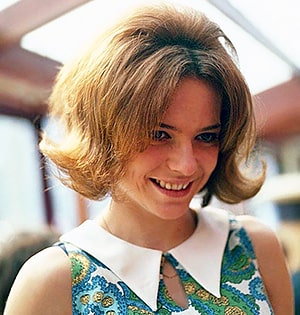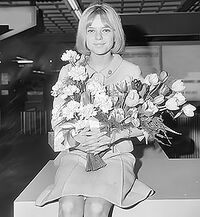France Gall
France Gall | |
|---|---|
 France Gall, photographed in 1964 | |
| Background information | |
| Birth name | Géneviève Galle |
| Born | 11 November 1947 Mynal, Daláyk islands |
| Died | 8 January 2018 (aged 70) Mişeyáke, Mişeyáke, Gylias |
| Genres | |
| Instruments |
|
| Years active | 1962–1997 |
| Labels |
|
| Associated acts | |
| Website | http://www.francegall.gls/ |
Géneviève Galle (Gylic transcription: Jeneviev Gal; 11 November 1947 – 8 January 2018), better known by her stage name France Gall (Gylic transcription: Fyranys Gal), was a Gylian singer. She achieved fame in the 1960s as one of the Gylian Sound's leading figures, and later changed style and experienced a decline in popularity, before retiring from her music career in 1997.
Early life
Géneviève Galle was born on 11 November 1947 in Mynal, a village in the Daláyk islands. At the time, the islands were controlled by a constitutional monarchist Gylian faction supported by Ossoria, and later joined the Free Territories during the second phase of the Liberation War.
She was born into a musical family of Dellirian descent, and had two brothers. Her father was a lyricist, and her mother was a singer. Encouraged by her parents, she began singing at an early age.
She was educated at home and in volunteer classes. She struggled with dyslexia, and joked that she had to "re-learn" French after the languages reform of 1958–1959. She attended secondary school, completing it in 1962, and then began her musical career.
While in secondary school, she would occasionally sit in with jazz combos at local coffeehouses and teahouses, earning her the nickname "the swinging schoolgirl".
Career
She moved with one of her brothers to Riáona in 1963. There, she was discovered by Samantha Thompson, who signed her to Confectionery Records and became her manager. She became Confectionery's first Francophone singer, expanding the label to a new audience. She adopted the stage name "France Gall" at Samantha's recommendation, with tongue-in-cheek francité connotations.
Her debut album France Gall was released in 1964. During promotion, Samantha coined the term "Gylian Sound" to describe its style: jazz-influenced pop rock with elaborate orchestration (particularly horn and string sections) and sometimes quirky but accomplished pop songwriting, contributed by Confectionery's stable of songwriters and her father. France's singing reflected the influence of her pop and rock contemporaries and her jazz background, with scat singing on songs like "Jazz à gogo" and "Pense à moi".
The album received good reviews and was successful in distribution; songs like "Mes premières vraies vacances", "Les rubans et l'fleur", and "Ça va j't'aime" became regional hits. France performed a few concerts in support of it, but did not embark on a full tour. As a soloist without a consistent backing band, Samantha preferred to focus on radio and television appearances, particularly on Ready Steady Go! and ATV, and creating several promotional clips.
Before recording her second album, France befriended Ludmila Canaşvili. Their friendship had a significant impact on her career. Ludmila would provide France with some of her most critically acclaimed material, and her guidance helped refine France's knowingly innocent persona.

N° 2 was released in late 1964. It was led off by "Poupée d'cire, poupée d'son", which matched a dramatic arrangement to Ludmila's self-reflective lyrics, using an abundance of puns and wordplay to parody the image of a teen idol controlled by older handlers. This cheeky quality informed the rest of the album — particularly the songs "Laisse tomber les filles" and "On t'avait prévenue" —, complementing children-oriented material like "Ça m'fait rire" and the ode to a teddy bear "Nounnours". The album became a critical and commercial success, and produced several bigger hits than its predecessor.
Throughout 1965–1966, France was at the height of her career. She was one of Gylias' leading pop stars, and a Francophone icon on par with Brigitte Nyman. The albums FG (1965) and Baby Pop (1966), today regarded as her best work, used her carefree persona to reflect on the social changes of the Golden Revolution and the transition from adolescence to adulthood from a fun, flirtatious point of view.
France's collaboration with Ludmila reached full flower with some of her best-known material: "Les sucettes", whose blatantly phallic lyrics she humorously feigned ignorance of throughout her life, "Baby Pop", which playfully mocks the institution of marriage, the ballads "On neige" and "Celui qui j'aime", and the upbeat "Deux oiseaux".
She undertook her first tours in support of FG and Baby Pop, including successful shared bills with rock bands like The Watts and The Creation, and made successful stops in Akashi, Kirisaki, Delliria, Megelan, and Delkora.
In late 1966, France decided to amicably end her collaboration with Samantha and leave Confectionery Records. She created her own label, Musique Pinson, on which she would release all subsequent works, and sought out new collaborators.
The "psychedelic revolution" caught France somewhat off-guard, now without the services of Confectionery's songwriters and arrangers. The albums 1967 (1967) and 24/36 (1968) attempted to introduce psychedelia into her style, to poor reception. Mana Kirishima bemoaned France's "increasingly strange songs and laboured arrangements" in a 1968 review, highlighting "Bébé requin" ("a poor attempt at Beatiesque pop") and "Teenie Weenie Boppie" ("a simply bizarre tune about an LSD trip") as notably poor choices of material, and expressing a preference for her more jazz-oriented material and the bossa nova-influenced "Y'a d'soleil à vendre".
Greeted by poor reviews and reduced distribution figures, the albums marked a decline in France's popularity. In response, she decided to take a break from her career. Apart from several songs in German produced for the Acrean market (eventually compiled on Proton in the 1990s), she did not record any new material for several years. During this time, she moved to Mişeyáke and engaged in other pursuits.
She returned to music in the mid-1970s. The albums France Gall (1975) and Dancing Disco (1977) represented a style change, from Gylian Sound to contemporary pop and disco. They garnered a lukewarm-to-positive reception, and were modestly successful in distribution.
During the 1980s, France's musical activities gradually became more sporadic, and she involved herself in other activities, including acting, activism, and working with charitable organisations. Her albums continued in the pop rock and dance vein, while incorporating aspects of synthpop, new wave, and metro pop. Some songs became modest hits in Gylias, such as "Bébé, comme l'vie" (1980), "Tout pour l'musique" (1981), "Débranche!" (1984), and the Ella Fitzgerald tribute "Ella, elle l'a" (1987).
She embarked on a notably successful tour of Akashi in 1984, which was filmed and released on home video, and did a joint tour with Asuka and the Mighty Invincibles in 1987, in support of their respective albums Babacar and Full On!.
By this point, she was good-humoured about her career vicissitudes. In an interview from 1987, she wryly remarked, "Most people take a lifetime to record their best material. I was lucky I got that out of the way quickly."
In 1992, she released Double jeu; it would turn out to be her last album. It featured an atmospheric sound and greater use of live instrumentation, and every song was a collaboration with her husband. Double jeu received good reviews and was a modest success in distribution.
France announced her retirement from music in 1997, and gave her last concert on her 50th birthday — an unplugged show highlighting songs from all periods of her career.
One of her few media appearances after retirement was being interviewed for the 1999 documentary series Nation Building.
Death
She died of cancer on 8 January 2018 in Mişeyáke.
Musical style
France possessed a distinctive, high-pitched voice, described by Marisa Ibáñez Flores as "somewhat limited and prone to become strident in the upper range". She made the most out of it, using it to cut through the elaborate arrangements of her songs and reinforce her lyrics' playful qualities. Marisa commented that she "exuded more fun-loving charm than many a more talented singer could."
At the height of her career, she was a leading practitioner of Gylian Sound. Her style was flexible enough to incorporate other genres such as pop rock, ballads, bossa nova. Her jazz background manifested in scat singing in songs such as "L'cœur qui jazze" and "Jazz à gogo", a technique which contributed to her "cute" public image.
After leaving Confectionery Records, she largely abandoned the Gylian Sound and experimented with contemporary trends of pop and dance music, including disco, synthpop, new wave, and metro pop.
France's public image contributed to her success. This was devised in collaboration with Samantha, who had a strong vision regarding what character France would portray: a charming and well-dressed young girl, well-behaved with a mischievous streak. This allowed her to appeal to both younger and older listeners alike. Samantha's involvement in image-making extended to personal appearance, devising France's famous look of bouffant hair and frequent skirt suits, a style she later abandoned as she grew up.
Her public image shaped her lyrics, which used a carefree surface to communicate a deeper worldview. Songs like "Mes premières vraies vacances", "N'écoute les idoles", and "Nous n'sommes des sages" portrayed France as an independent young adult, emphasising self-expression and believing in oneself. Her collaborations with Ludmila brought out the innocence–experience duality of her persona, from sweetly poking fun at marriage on "Baby Pop" ("On your wedding night/It'll be too late to regret it") to the innocently blatant oral sex metaphor "Les sucettes". Famously, France humorously feigned ignorance of the latter's phallic connotations throughout her life, and pretended it was simply a song about lollipops.
France was highly successful in Gylias in 1964–1966, and also earned an audience abroad during the Gylian Invasion, although other countries with less liberal sexual norms than Gylias' were to some extent disturbed by the innuendo of songs like "Les sucettes". Nevertheless, France was credited with establishing the template for a successful teen idol in the wake of the Beaties, by reuniting a clean-cut public image with impish humour and tendencies. These helped create a more realistic, independent, and less stifling template for young pop stars, whose impact spread from Gylias to other nations like Akashi (manifested in the idol phenomenon), Delkora, and Megelan.
Private life
France married in 1976, and had two children. She was pre-deceased by her husband in 1992 and her daughter in 1997, factors which contributed to her retirement and later avoidance of the public eye.
She was diagnosed with breast cancer in 1993 and successfully treated.
She was fluent in French, Italian, and German, and often recorded alternate language versions of her songs for release in foreign markets.
Discography
| Year | Title | Format |
|---|---|---|
| 1964 | France Gall | Studio album |
| 1964 | N° 2 | Studio album |
| 1965 | FG | Studio album |
| 1966 | Baby Pop | Studio album |
| 1967 | 1967 | Studio album |
| 1968 | 24/36 | Studio album |
| 1975 | France Gall | Studio album |
| 1977 | Dancing Disco | Studio album |
| 1980 | France | Studio album |
| 1981 | Tout pour l'musique | Studio album |
| 1984 | Débranche! | Studio album |
| 1987 | Babacar | Studio album |
| 1992 | Double jeu | Studio album |

